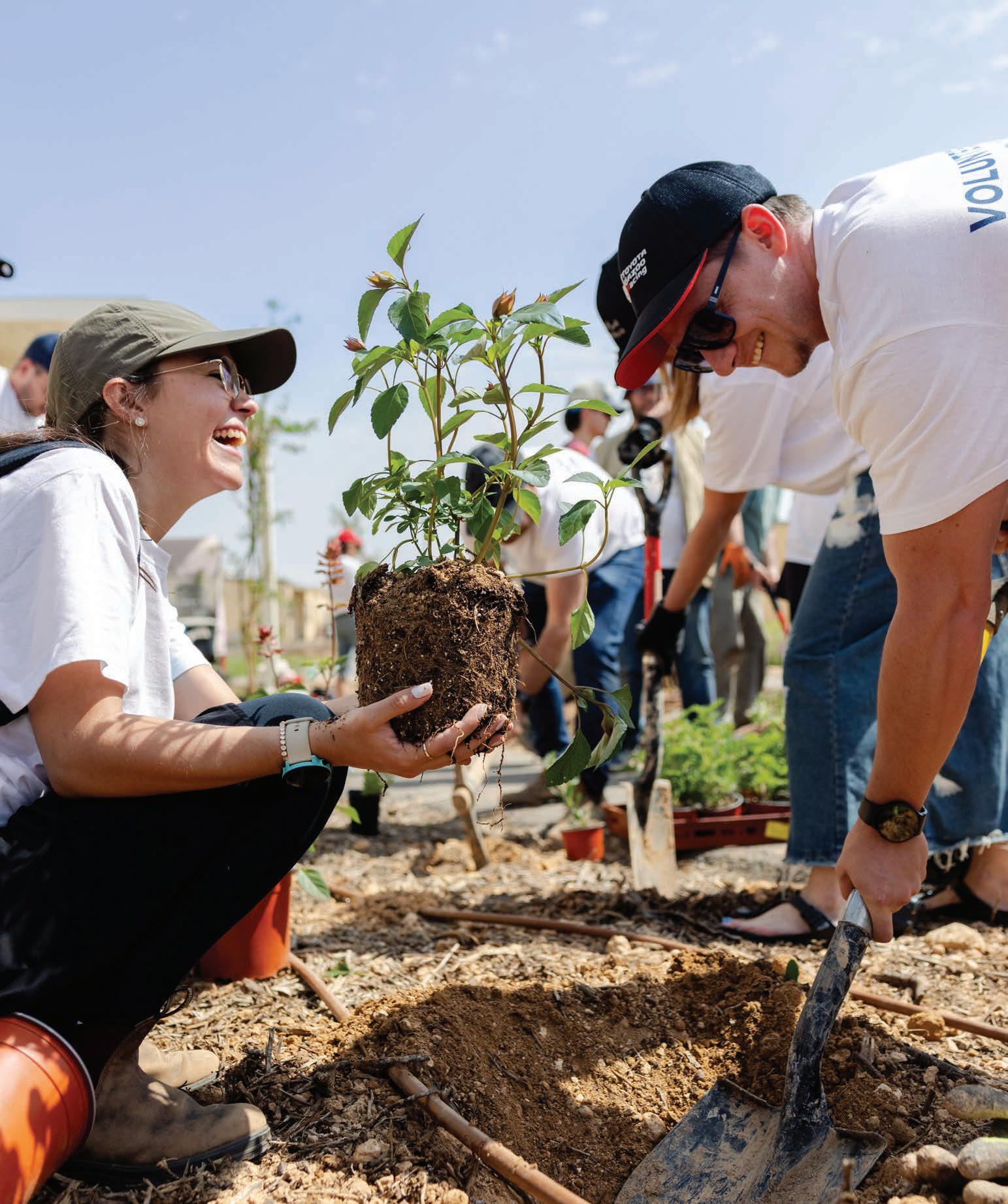

JOURNEYS JOURNEYS
ISSUE 21 · AUGUST 2025
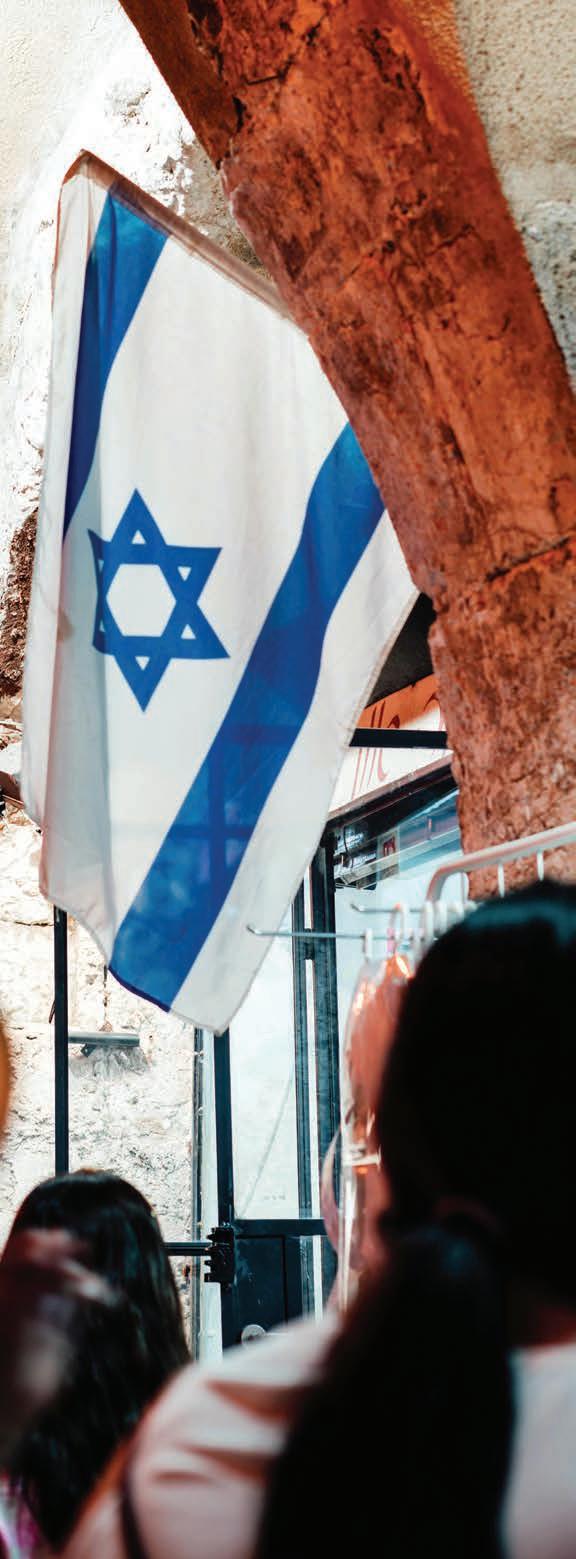
In 2024, as Israel fought its biggest war in decades and global Jew-hatred surged, 18,700 Jewish young adults chose to travel to Israel with us. They weren’t deterred. They were determined — to understand the reality on the ground, affirm their Jewish identity, and deepen their connection to the land and people of Israel.
It was all thanks to you. Your generosity helped our participants find their voice, and their place in the Jewish story. In 25 years, Birthright Israel has become a global movement for instilling Jewish pride and purpose. It's a rite of passage, a launchpad, and a catalyst for lifelong Jewish connection.
63% of last summer’s participants said Birthright Israel was “one of the best experiences of my life.”
Brandeis University researchers asked: how did the trip change them? The results speak volumes. Compared to nonparticipants, alumni are:
more likely to report feeling very connected to Israel.
more likely to post regularly in support of Israel on social media.
more likely to challenge anti-Israel claims with counterarguments. of tourists to Israel under the age of 30 in 2024 were Birthright Israel participants. *
But they didn’t just discover Israel — they found community.
81 76 said hearing from Israelis directly about their experiences in the war was very meaningful.
said being part of a Jewish peer group was very meaningful.
This is what happens when Jewish young adults experience Israel firsthand: they return ready to engage, educate, and lead. And your support makes it possible.
Birthright Israel is creating leaders, builders, and defenders of Jewish life. And it is doing so even in the most challenging of times.
Thank you for helping us bring our young people to Israel. Because if we don’t bring them, who will?
*According to Israel’s Ministry of Tourism
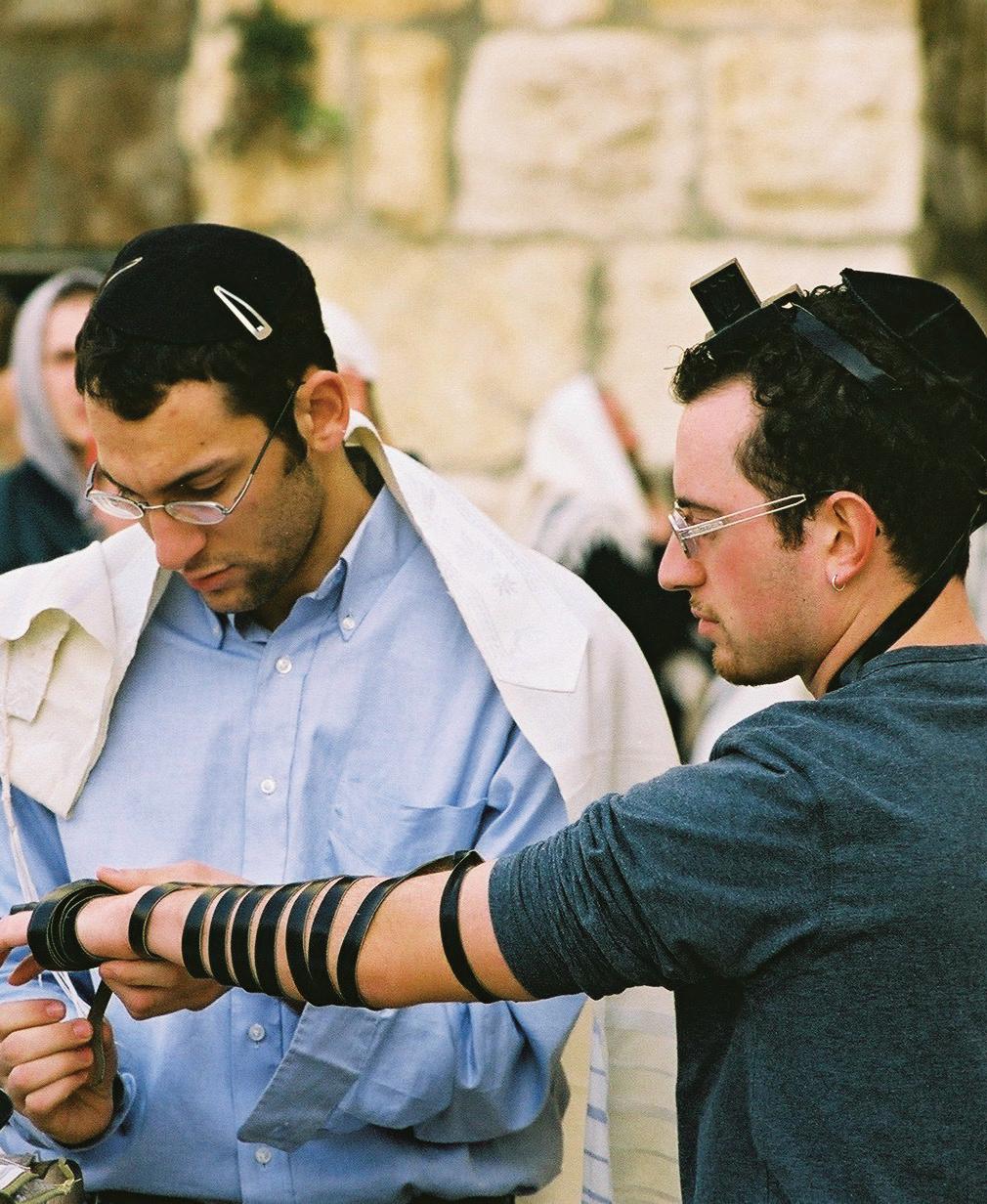

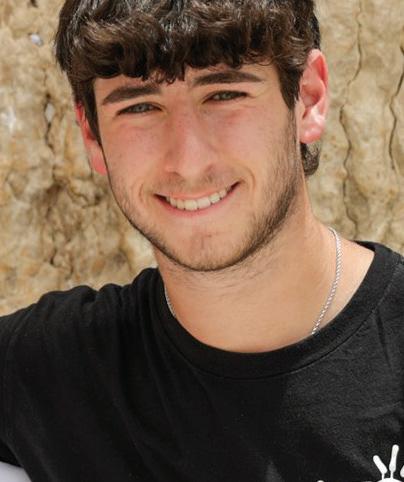
Birthright Israel Changed my life
I am honored to hear the same five words all the time: “Birthright Israel changed my life.”
I can relate. I grew up in a home with no Shabbat candles and no Passover Seder. As a teenager, I felt disconnected from the Jewish community, unaware that my identity could be a source of resilience and pride.
Then in 1999, I was fortunate to join the first-ever Birthright Israel trip. It was a revelation: At the inaugural Birthright Israel Mega Event, standing among thousands of Jews from around the world, I realized I was not alone; I was part of a proud 3,500-year-old Jewish legacy. The experience set me on a lifelong path of Jewish meaning, purpose, and connection. Today, I have the privilege of paying it forward by sharing the miracle of Birthright Israel with the next generation.
My story is not unique – far from it. Over 25 years, Birthright Israel has impacted more than 900,000 participants and created ripple effects on their friends, family members, and communities.
How do we know? From the beginning, we’ve been committed to rigorous evaluation by independent researchers. In 2009, the Cohen Center at Brandeis University launched the Jewish Futures Project, a longitudinal study that measures Birthright Israel’s longterm impact on our participants, comparing them to their peers who applied for a Birthright Israel program but never participated. The results demonstrate that Birthright Israel is shaping the Jewish world in ways we had only imagined.
We already knew from previous studies that Birthright Israel participants are four times more likely to feel connected to Israel, even 20 years after their trip. They are twice as likely to feel part of the global Jewish community and more likely to have Jewish friends, celebrate Jewish holidays, take a leadership role in a Jewish organization, and support Jewish causes. One-third of our participants have returned to Israel. Many participated in a Birthright Israel Onward program, and thousands of our alumni have traveled to Israel since October 7th to help support and rebuild communities impacted by the war on our newly established Volunteer Program.
But now, as Birthright Israel alumni become parents, we see just how far that impact extends. The latest study from Leonard Saxe and his team at Brandeis University tells a powerful story: Birthright Israel alumni instill Jewish pride and identity in their children.
The groundbreaking study demonstrates that 84% of Birthright Israel participants who are parents are raising their children exclusively Jewish, regardless of their spouse’s background. Our alumni are 122% more likely to celebrate their child’s bar or bat mitzvah compared to their peers who applied to go on a Birthright Israel trip, but never went. They are 65% more likely to send their children to Jewish overnight camp, 50% more likely to enroll them in Jewish day camp, and 44% more likely to enroll them in a Jewish supplementary education program.
These extraordinary numbers confirm what many Birthright Israel alumni — especially parents like me — already know: our children are far more likely to grow up with strong and proud Jewish identities.
Today, Jewish college students face unprecedented antisemitism and anti-Israel bias on campuses. From protests vilifying Israel to professors distorting Jewish history, the rise in hostility makes it clear: Jewish young adults need our support now more than ever.
When Jewish young adults feel connected, confident, and empowered, they carry that strength forward and pass it on to the next generation. Parenthood may not be on their minds yet, but one day, many will have children of their own. When that day comes, the values and experiences we instill in them now will take on new life.
Birthright Israel does more than change lives — it creates a ripple effect that strengthens Jewish identity for generations. With 900,000 alumni and counting, the reach is exponential.
To keep the Jewish people strong, resilient, and united, we must continue lighting the path for those who come next. The impact is clear and proven. Now, it’s up to us to invest in the next generation and beyond. Supporting Birthright Israel means securing the Jewish future — because when we change one life, we create a ripple effect that strengthens Jewish engagement for generations to come.
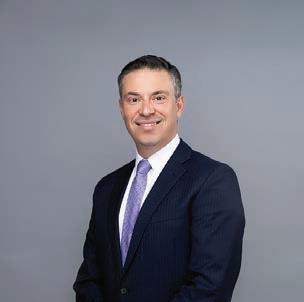

President and CEO, Birthright Israel
Foundation
We became on birthright Israel
Jenn and Elie Zussman met as college students on one of the first Birthright Israel trips in 1999. They married in 2006 and live in Maryland with their two daughters.

I grew up in Baltimore, Maryland, in Pikesville, with a strong Jewish community. My upbringing felt very natural and supportive. But when I went to the University of Georgia, I rushed a sorority and got cut from 16 houses right away. I’m 4’11” and came in wearing khakis and Birkenstocks; I stood out. I joined the Jewish sorority and got involved with Hillel. That was how I heard about Birthright Israel. I was figuring out what I wanted my life to look like and needed guidance. I was craving a deeper spiritual connection but didn’t know where to find it. So, when the opportunity for a free trip to Israel came up, I just said yes. I didn’t hesitate. I didn’t know anyone else going, and I liked that. I wanted this to be my own journey.

My dad was born in British Palestine and left for America to go to college. He was proud of Israel, but it wasn’t a land of opportunity in his eyes like America was. He never spoke Hebrew to us. My mom grew up Orthodox in Pennsylvania. By the time I came along, we lived in Northern California and were Reform: Hebrew school two days a week, bar mitzvahs, and that was it. My dad would eat a ham and cheese sandwich on Yom Kippur without guilt. But being Jewish was 100% a part of my values—how you treat people, the emphasis on education.
In college at Emory University, I joined a Jewish fraternity. Birthright Israel wasn’t even on my radar until Hillel mentioned it. I signed up, not thinking much of it, and I ended up 80th on the waiting list. I figured that was the end of it. Then, out of nowhere, I got a call that many applicants had dropped out—it was 1999, during the Second Intifada. I had to decide within an hour. I said yes and packed my bags.
Jenn:
It was just before New Year’s Eve. The president of El Al was aboard our flight, and there was so much energy. It felt like Club El Al. But then, something crazy happened. We were on the runway, ready to take off, and there was a bomb threat. Everyone had already taken sleep meds, so we were groggy when we had to disembark and wait for hours. They gave us hot dogs to keep us going. Eventually, we boarded the plane again. When we landed, I had a strange feeling of familiarity. I let my guard down. Even though I’d never been to Israel, I felt like, “Wow, Israel is home. This is where I’m supposed to be.”
Elie:
It snowed in Jerusalem, the first time I’d ever experienced snow. It was amazing to hear Hebrew being spoken, to see the cultural diversity. Every hotel we stayed at was filled with Birthright Israel participants. So, everywhere we went, it felt like we were with our people. It sounds silly to say, but as American Jews, we thought Israel was very solemn and somber. But we were shown that being Jewish and being in Israel could be joyful and fun, too.
Our group was one of the very first Birthright Israel trips. The organizers told us we might have even been on the first flight. The fact that it was so new and groundbreaking made it feel even more special.
Jenn:
Climbing Masada at sunrise was where I first noticed Elie. When we met, I asked him to carry my journal in his backpack, just to break the ice. I’ve always been very instinctual, and I could tell right away he was solid and trustworthy. I just knew he was a good person. I thought, “I’m not letting this one get away.” That night was New
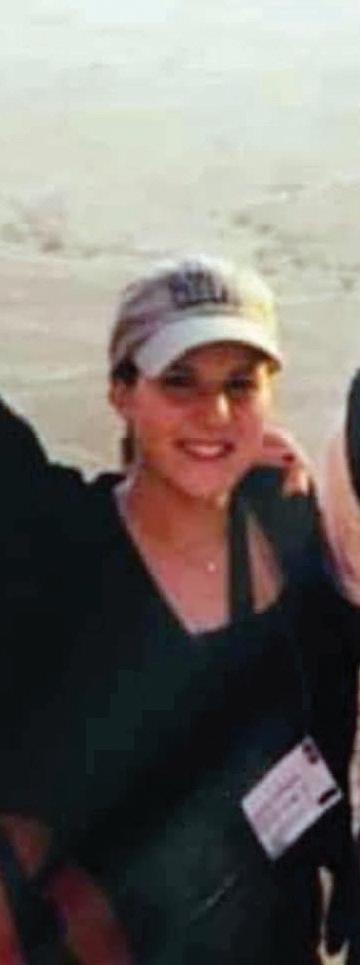
Year’s Eve, the dawn of the new millennium, and we were celebrating at the Dead Sea. I didn’t know what to say, so I asked him, “What’s your major?” He said, “Chemistry.” I said, “Oh my gosh, do you feel the chemistry between us right now?” He thought I was insane. I asked, “How tall are you?” He said, “Five-five.” I told him, “Elie, I’m perfect for you. I’ll always make you feel tall.” When the clock struck midnight, we kissed for the first time.
Elie:
Jenn had this incredible energy. When she asked me to carry her journal in my backpack, I was thrilled. It gave me a reason to talk to her. She had an aura about her, and it’s hard to explain, but I had a feeling she was my kind of person. She was exciting and I wanted to get to know her better. We didn’t actually kiss at midnight—it was more like 12:45am.
Jenn:
We went to the Kotel together. If you want to be cynical, it’s a wall. You might just be, like, I don’t get it. But Elie and I stood there in front of the Kotel, and there’s a picture of us holding hands, our foreheads touching. There we are, in front of G-d, in the most spiritual place on earth, thinking, “I found my soulmate.” It was just so clear to me. Everything happened because of this trip.
Jenn:
Elie:
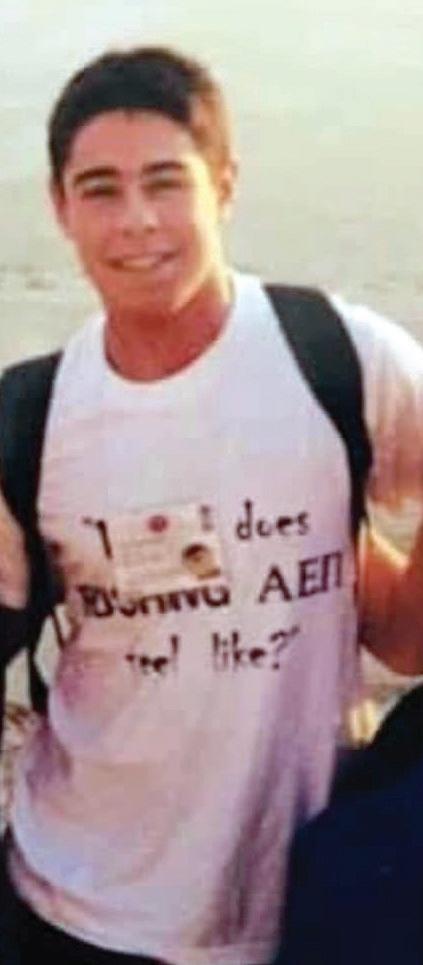
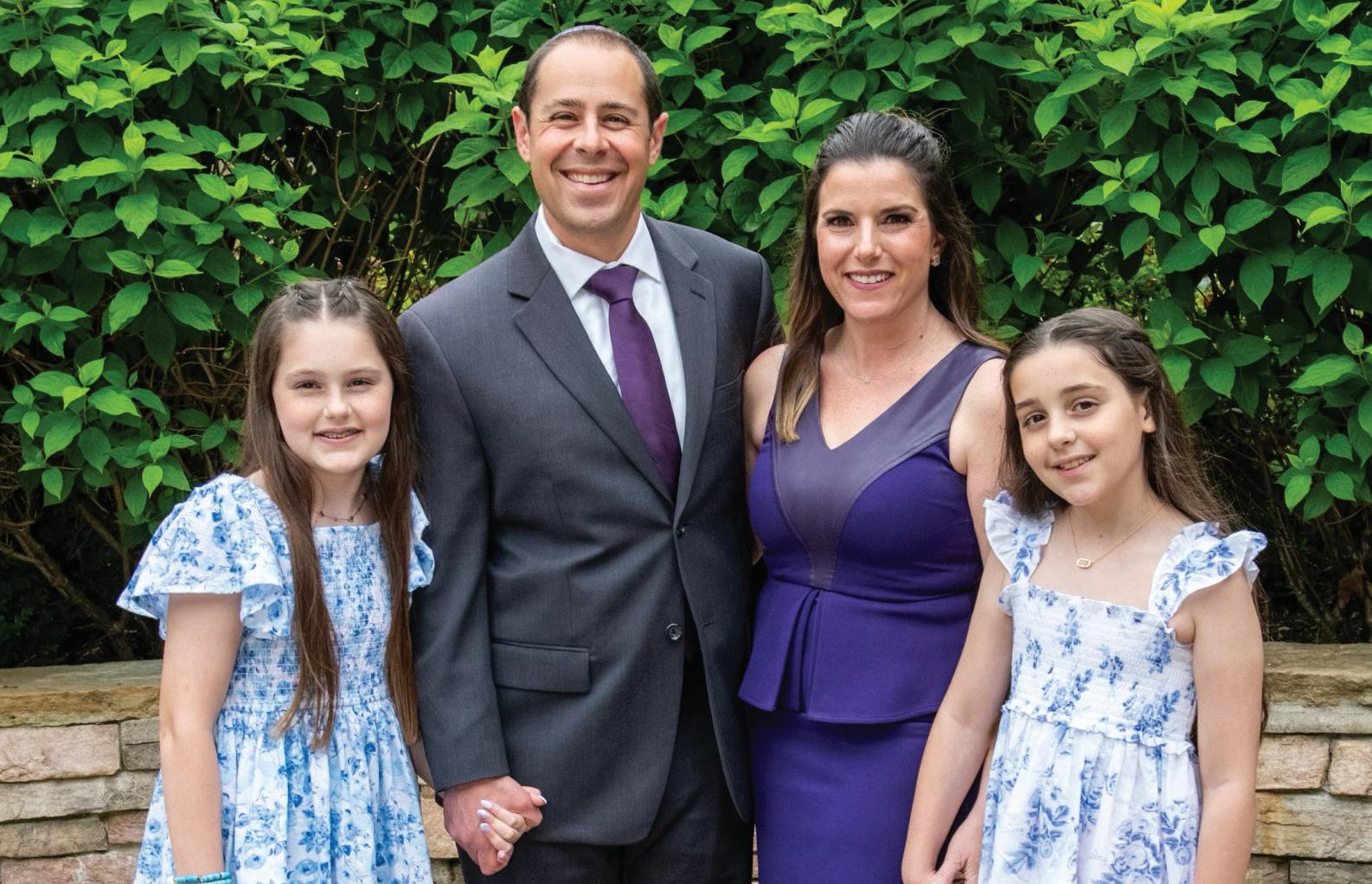
At 20, my life was like a deck of cards. There were certain cards I couldn’t change—my family or where I grew up. But on Birthright Israel, I began to see the cards I could play differently. I could decide what major to choose, how I wanted to live, and who I wanted to spend time with. That gave me so much clarity and strength to find my voice. I felt empowered to create the life I wanted. When I came back from Israel, I was Jenn 2.0.
Elie and I started dating seriously after the trip. He was at Emory—a much more Jewish school than mine, and I felt comfortable there. We got married in 2006. I always say, our relationship is like a zipper: it just goes up; we fit together. Now, we have two incredible daughters. It took a while to figure out how to introduce Judaism to the girls. But now, they both attend Jewish day school. The girls need to understand where they come from, why they’re so special, and the amazing gifts they have. I teach them that they have the power to make choices, just like I did. We’re planning to Bat Mitzvah our youngest daughter at Masada. To have her stand where Elie and I first met.
Elie:
Without Israel, I wouldn’t be here. My grandfather came to Israel from what is now Lithuania; back then it was Poland. His family owned a couple of microbreweries. He was
so sick of the antisemitism and violence, his family managed to get him a visa to go to British Palestine. So, he did. And although he was educated, he ended up paving roads in the desert. Now comes the sad part of that story. His parents missed him and asked him to come visit. He had been visiting them for a few weeks, when the family was rounded up and put on a train to Auschwitz. His grandfather told him, “You need to jump off. You have papers that will let you leave the country.” And so, he jumped off the train and never saw his family again. I am named after his brother, who died in the camp.
My grandmother was from Poland, too. She didn’t want to join the family business, which had something to do with fishing, so she went to study early childhood education in the Netherlands. There, she saw the writing on the wall. She fled to British Palestine and opened a daycare. My grandparents met at a sandwich shop.
Jenn:
I love the Jewish people—how altruistic and interconnected they are. Especially after October 7th, we don’t have the luxury of not being there for each other. We can’t live life with blinders on. Now more than ever, we have a responsibility to show up for our fellow Jews.
Birthright Israel is just the most incredible program. You can read books and see pictures,
but until you’re on the ground, you can’t truly grasp what makes Israel so special. I feel so indebted to the founders of Birthright Israel. That one experience gave me my life—a successful marriage of 18 years, two Jewish children. That never would’ve happened if it weren’t for that one trip.
Elie:
Our ancestors taught us what’s important— that your faith, your values, your family, and your education are all that matters. And if you have that foundation, you can rebuild anywhere, anytime. It may not be easy or pleasant, but with sacrifice and the right set of values, you can do it.
Birthright Israel was one of the seminal moments of my life. It put me on the path to a Jewish life, which was never a guarantee. Jenn and I will always feel connected to Judaism and Israel because of our story.
If we are not living for our children, who are we living for?
Lori Komisar has long been a force in Jewish philanthropy. As Vice Chair of Birthright Israel Foundation, she brings both strategic leadership and a fierce commitment to ensuring every Jewish young adult has the opportunity to visit Israel. But her dedication goes far beyond boardroom decisions — it’s deeply personal, and now, everlasting.
Lori and her life partner, Morrie Silverman, have made a legacy gift through the Fund for the Jewish Future, securing their commitment to Birthright Israel’s mission for generations to come. For them, it’s about continuity, community, and conviction.
“I want every Jewish young adult on the planet to set foot in Israel,” Lori says. “Birthright Israel is one of the most powerful organizations of any kind, ever — because it truly changes the lives and attitudes of our young people.”
Lori and Morrie weren’t always steeped in Birthright Israel. They came to the Foundation more than a decade ago when Lori’s children were preparing to go on the 10-day trip — and were struck by how transformational the experience was, especially for young Jews with little prior connection to Jewish life. “Once they are in Israel, something inside them awakens,” Lori says. “They realize: this is my home. These are my people.”
Lori and Morrie are especially moved by stories of participants from secular households, some of whom even face resistance at home for choosing to go. “They may not know why they want to go — and their parents may not understand why it matters — but once they’re there, they know,” Lori explains. “It becomes clear. They’re part of something.”
For them, that sense of belonging is where the true power of Birthright Israel lives. “Being Jewish, you often grow up feeling separate,” Lori says. “You go to synagogue, maybe you have a community, but you don’t feel part of something larger. Birthright Israel gives you that context — not just content, but context — which you can’t get any other way.”
Their planned gift is just one part of their investment to the Foundation. Lori and Morrie are also committed to giving during their lifetimes — to see, feel, and celebrate the impact. “When we go to Israel, we see a Birthright Israel bus, meet alumni, and attend events,” Lori says. “We can hug them. Talk to them. That’s the joy of it. That’s the impact.”
It’s not about recognition or buildings. “We’re not building buildings. We’re building people,” Lori says. “And when you give to Birthright Israel, you’re not just supporting a trip. You’re giving Jewish young adults the strength to face the world — and each other — with pride.”
Lori and Morrie have discussed both annual giving and legacy giving as a natural combination. “We signed a letter of intent that when we are no longer here, there will be a financial gift,” Lori says. “But we’ve also agreed that if we have a capital event, we’ll give while we’re alive. Because giving while you’re here lets you enjoy who you give to. And that’s very, very important.”
Lori also acknowledges the financial logic behind planned giving. “If you look at it from a business standpoint, it’s a prudent financial decision,” she says. “An endowment can offset taxes — but more importantly, it guarantees that young people will continue to benefit long after we’re gone.”
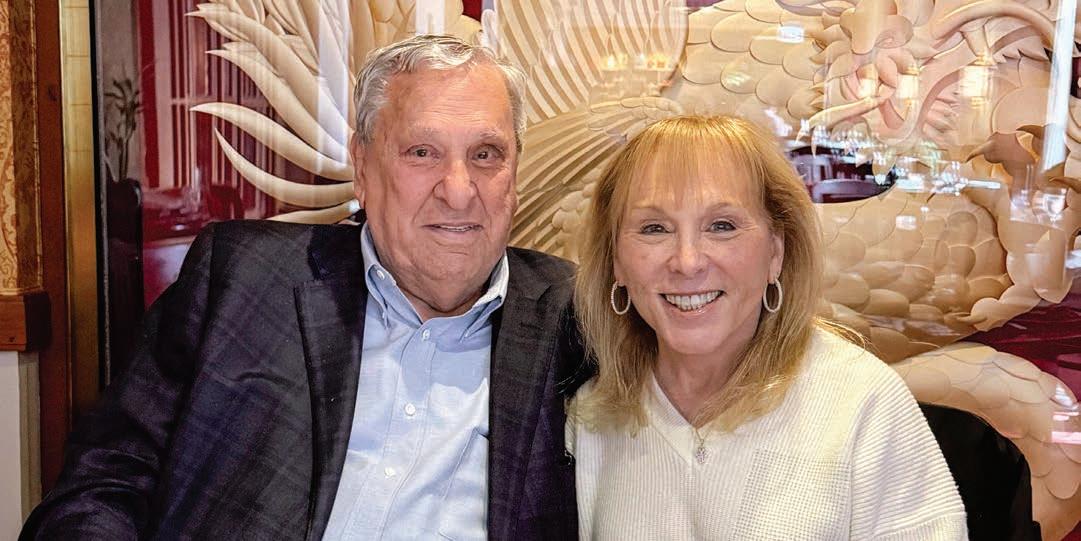
Lori envisions a future where Birthright Israel becomes a true rite of passage — one that’s woven into the fabric of Jewish life. “I hope it becomes so deeply ingrained that it doesn’t depend on year-to-year fundraising,” she says. “That’s why this legacy work is so important.”
And she sees the need for that future more clearly now than ever. “We need to take these young adults and give them a week, or ten days, just to breathe,” she says. “To be together. To feel strong. That’s what Birthright Israel does.”
In times of rising antisemitism and growing uncertainty, Lori sees Birthright Israel as a source of strength — a force for confidence and connection. “It’s a lifeline,” she says.
She is also deeply inspired by the broader Birthright Israel community. “Whether lay or professional, everyone involved in Birthright Israel is extraordinary,” she says. “They live and breathe what’s right. They’re passionate, they help each other, and they show up. It’s a paradigm of what the Jewish community should strive to be.”
Her message to other donors is both heartfelt and direct: “Why wouldn’t you want your children — or someone else’s children — to be part of something this strong, this unifying, and this essential? If you’re Jewish, this matters.”
Lori’s vision for the future of Birthright Israel is about more than survival — it’s about thriving. “If we each give to Birthright Israel a piece of what we’re going to leave to our children,” she says, “then the children we’ll never know will have the gift of Birthright Israel. And they will not be denied this once-in-a-lifetime experience.”
Ultimately, Lori and Morrie’s philanthropy is rooted in a generational promise — one that transcends headlines or moments in time. “You’re joining a worldwide organization where your children — and all Jewish children — can benefit,” Lori says. “And that benefit stays with them, for life.”
Through their leadership, generosity, and vision, Lori and Morrie are ensuring that legacy takes root — and that the Jewish future is not only protected, but proudly lived.

The Jewish Future Is Not Guaranteed. You Can Change That. Make Your Planned Gift Today.
The Jewish people stand at a crossroads. Rising antisemitism and growing disconnection threaten our global community. We can’t afford to wait.
By joining the Fund for the Jewish Future, you help build a stronger tomorrow — one where Jewish pride endures, our connection to Israel deepens, and future generations carry our legacy forward.
Jane Sherman, a visionary leader and founding supporter of Birthright Israel, shares why she and her husband Larry took action:
“I’ve always believed that trips to Israel are the most powerful way to build Jewish identity. Supporting Birthright Israel is the most important thing we can do for the Jewish future. We want to make sure that Birthright Israel continues. We want our greatgrandchildren’s generation to have the advantage of visiting Israel.”
Jane Sherman, Founding Board Member and Planned Giving Donor
Join Jane and Larry, and others who refuse to leave tomorrow to chance. Your planned gift to Birthright Israel Foundation will help ensure that the Jewish people not only survive, but thrive.
The time is now. Learn more here:
WHAT DOES ONE TRIP TO ISRAEL DO?
ONE TRIP CHANGES EVERYTHING.
After 25 years and nearly one million participants, we’d like to share our new way to tell the story of Birthright Israel: One trip changes everything.
It’s what we hear, again and again, from our alumni. It’s what the research confirms. And it’s what we see in Jewish young adults who return from Birthright Israel more connected, more confident, more committed, and more excited to be Jewish than ever before.
Birthright Israel truly is one trip that changes everything. When being Jewish starts to feel meaningful and personal – for so many, for the first time. When Israel becomes real. When they find their community. The trip lights a spark. And that light shines for a lifetime.
We chose these words because they express the heart of what Birthright Israel does. For our participants, something shifts. Something opens. A deeper connection begins.
It would be enough if the trip changed everything for our participants only. But the truth is, the impact is far greater and wider reaching. Our alumni become leaders in Jewish communities everywhere, making them stronger, safer, and full of life. They transform the entire Jewish world and the future of our people.
So, Birthright Israel is one trip that changes everything, plain and simple. It’s the best way to tell our story. And it’s a reminder of what’s at stake: every young Jewish person deserves this opportunity to discover who they are and where they come from.
Because when they do, everything changes.
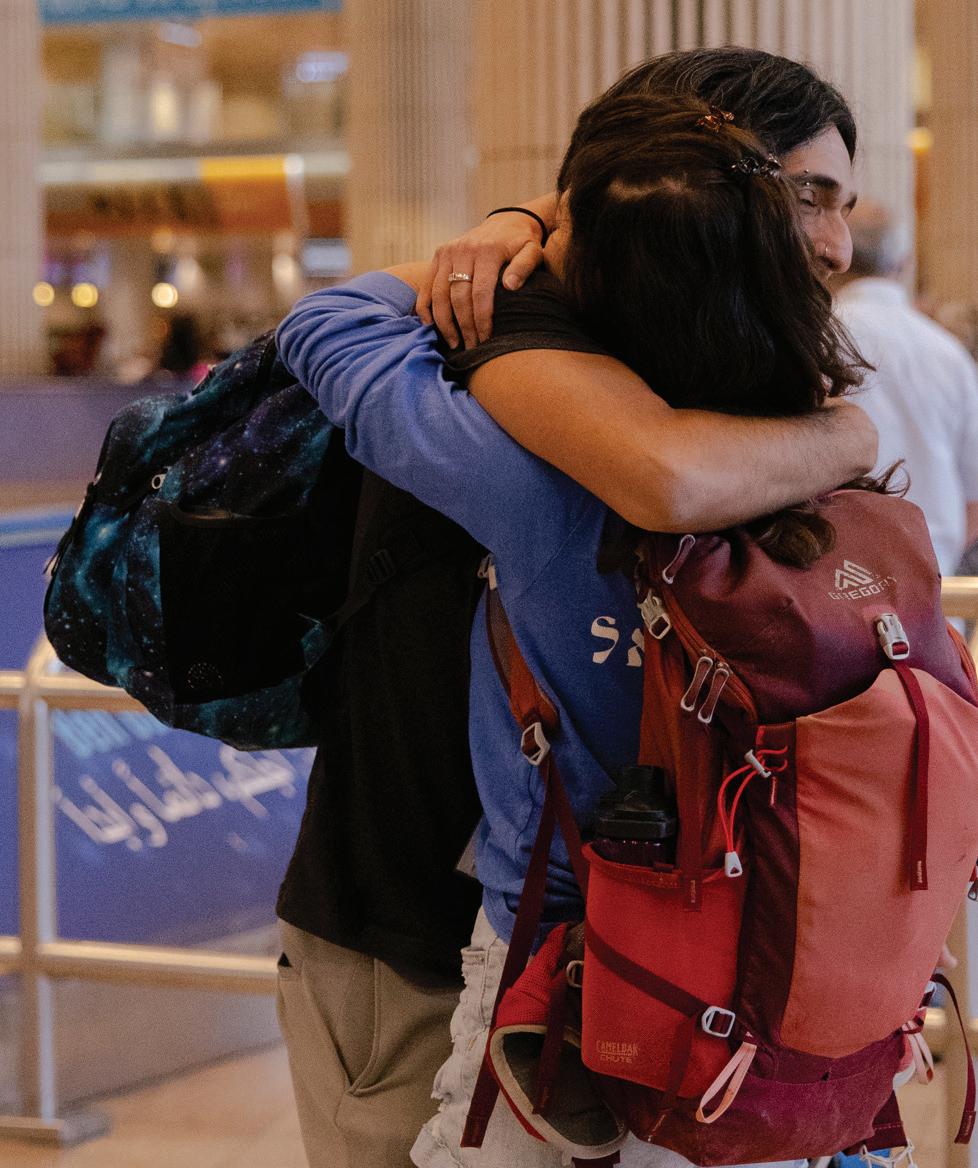
ONE TRIP CHANGES EVERYTHING.
Birthright Israel was a deeply meaningful journey that gave me a new perspective on my Jewish identity, culture, and community. I walked the ancient streets of Jerusalem, floated in the Dead Sea, and had so many other unforgettable experiences. I cherished the chance to speak with Israelis, learn about their lives, and discover both the diversity and unity within Israeli society.
It was so powerful to share this experience with a group of Jewish peers who were just as curious and excited as I was. Together, we asked questions, shared stories, and supported each other as we learned more about what it means to be part of the Jewish people. That feeling of community and belonging is something I'll carry with me forever.
None of this would have been possible without your generosity. Your support gave me and so many others the chance to strengthen our Jewish identity, build lifelong friendships, and forge a lasting connection to Israel. It's an experience I will always treasure, and I am so grateful to you for making it happen.
THANK YOU FOR BELIEVING IN THE IMPORTANCE OF THIS JOURNEY AND FOR HELPING TO SHAPE THE FUTURE OF THE JEWISH COMMUNITY THROUGH YOUR KINDNESS AND SUPPORT.
“ Thank you so much for allowing me to have this incredible experience. You have truly changed my life and have made me realize how important it is to be Jewish. I also have a deep love for Israel now, and your contribution allowed for that to happen. Thank you again.”
“ I can’t thank you enough for making this trip possible. It was truly the most impactful week of my life. Not only did I make friendships and connections that will last a lifetime, I now feel very connected to Israel and my Judaism. I feel I have the tools to combat antisemitism. I can’t thank you enough.”
“ Thank you for this trip. It opened my eyes to Israel as an extension of home and the Israelis and my group mates as extended family. At Har Herzl we shared in the grief of the Israelis and connected with them, as a rocket siren emphasized the reality of the situation and the meaning of the sacrifice. After this trip, Israel no longer feels like a destination, it feels like a place I've known all my life. The friends I made there are just as important to me as my friends back home, and this reality feels like my reality now. Thank you, Am Yisrael Chai!”
“ This has been the most incredible experience of my life. I find myself at a loss for words in trying to describe what this experience has done for me. It truly is such a unique, once-in-a-lifetime experience and I am forever thankful I took the leap to embark on this journey. Thank you to the trip organizers and the organization as a whole. I don’t know who I would be without this experience. Am Yisrael Chai!”
“ Thank you so much. Thanks to you I have made lifelong friendships and have solidified my connection to my Jewish peers and community. Thank you for funding this once-in-a-lifetime trip. You have changed 47 lives. 37 Americans. 8 Israeli soldiers. 2 Madrichim. And the best tour guide we could have asked for.”
“ I want to extend my heartfelt thanks for making my Birthright Israel experience possible. Because of your generous support, I had the incredible opportunity to explore Israel, connect with my heritage, and create memories that will last a lifetime.”
“ Thank you so much for deepening my love and adoration for Israel. This trip was so meaningful and I really enjoyed being here. This is the gift of a lifetime.”
“To all of the donors, nothing we experienced would be possible without you. A sincere thank you for providing a once-in-a-lifetime experience.”
These quotes come from participant testimonials that were submitted anonymously / May 2025
The Generational Impact of Birthright Israel
We hear it all the time: “Birthright Israel changed my life.” But how do we measure impact beyond anecdotes? That’s where the Jewish Futures Project (JFP) comes in. Since 2009, Brandeis University researchers have tracked our alumni, comparing them to peers who applied but didn’t go on a Birthright Israel trip. The latest groundbreaking research demonstrates that Birthright Israel doesn’t just change lives—it strengthens Jewish identity for generations. Alumni live Jewish lives and pass that connection to their children. With 900,000 alumni, the ripple effect is extraordinary. Investing in one young adult means investing in the Jewish future.
900,000 Jewish young adults have participated in a Birthright Israel program.
Impacting the Next Generation
Birthright Israel participants have a 122% higher likelihood of their children celebrating a bar or bat mitzvah.
Birthright Israel participants are 65% more likely to send their children to Jewish overnight camp. 65%
Birthright Israel participants are 44% more likely to enroll their children in supplementary Jewish education. 44%
of Birthright Israel participants are raising their children exclusively Jewish, regardless of whether their spouse is Jewish. 84%
Connection to Israel & Jewish Identity
Birthright Israel participants are 2x as likely to feel “very connected” to Israel. 122% 2x
Birthright Israel participants have returned to Israel since their trip. 1 in 3
Birthright Israel participants are 50% more likely to send their children to Jewish day camp. 50%
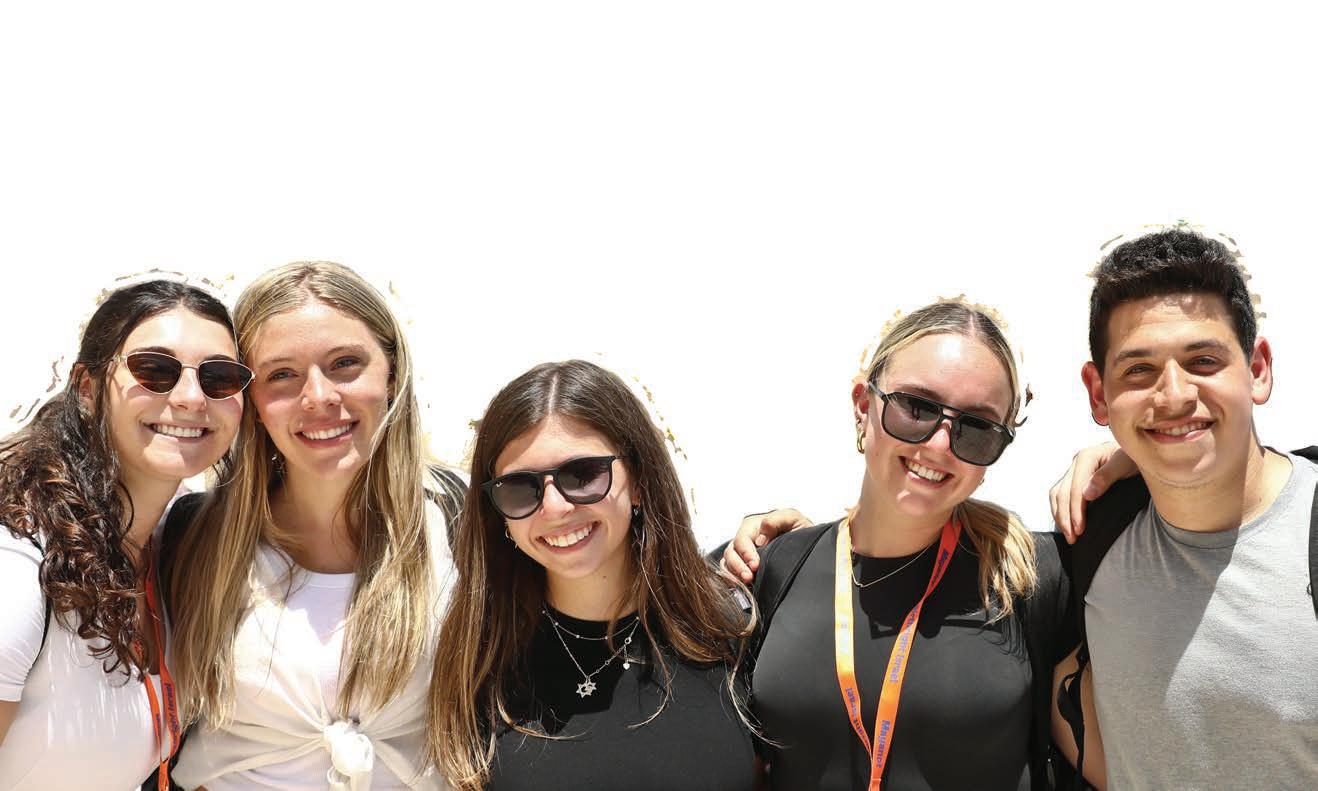
Birthright Israel alumni are 150% more likely to serve in leadership roles in Jewish organizations. 150%
Birthright Israel Inspired My Work to Preserve Holocaust Memory
I grew up in Wellington, Florida, a quiet suburb on the western edge of Palm Beach County. Back then, it felt like the middle of nowhere, the last stop before the hinterlands. To the north was rural Loxahatchee, with its giant trucks and Confederate flags. To the west and further inland, you had Belle Glade, then one of the most impoverished towns in America. And then there was Wellington itself: a brand-new middle-class community with a growing Jewish population. That was my bubble.
I came from a secular but unmistakably Jewish family. My parents were hippies. We didn’t keep kosher, but we didn’t eat pork or red meat either. I like to joke that we kept "Florida kosher" — lots of shellfish. I had my bar mitzvah at Temple Beth Torah, the only synagogue in town at the time, and celebrated Passover at my grandparents’ house in North Palm Beach. My dad’s parents — Bubbe and Zadie — were pillars of the local Jewish community. They were amongst the first lay leaders of the Jewish Federation of Palm Beach County and helped lead its first mission to Israel in the 1970s. Their mahogany-paneled study was filled with plaques and certificates from Federation and the Jewish National Fund, and shelves lined with books on Israel and Jewish history. In their heyday, they traveled to Israel every year. Jewish education mattered deeply to my grandparents. But like many secular Jewish kids, I didn’t love Hebrew school. My dad, a season ticket holder for the Miami Dolphins, would often pull me out early on Sundays when there was a home game. Those were the best days, when we left early and headed to the stadium.
Then, one Sunday when I was 11, my dad dropped me off at Hebrew school and we saw something spray-painted on the wall in huge red letters: "Hiter Was Here," with a swastika. H-I-T-E-R. The misspelling didn’t make it any less frightening. It was one of those images you never forget. I remember the shock of it, the local news crew filming, and our synagogue members whitewashing the wall. I asked my dad if I was safe. He told me not to worry, that it was probably just a stupid kid. Turns out, it was a middle school classmate, a kid from Loxahatchee.
That day, our cantor, whose parents were Holocaust survivors from Ukraine, addressed us directly. He told us that the Ku Klux Klan had a presence in Loxahatchee, just ten minutes away. Then he asked us, "What would you do if they came marching down our street tomorrow?" We were just kids. But we understood: antisemitism wasn’t just something from the history books. It was real, and it lived right outside our community.
In 2000, I was a student at Florida State University in Tallahassee. I majored in psychology mostly because I didn't know what else to do. I’d go to Hillel now and then for bagel brunches or Rosh Hashanah, but back then, Hillel wasn’t the best at engaging kids like me.
Then one day, a friend told me he had just come back from a free trip to Israel through a brand-new program called Birthright Israel. He asked if I was eligible. “Are you at least half Jewish?” I said, “Bro, I’m 100%. I’m all in.” It sounded too good to be true.
The Second Intifada broke out that fall, but I wasn’t scared. I knew Israel wasn’t some war-torn disaster zone. I also knew there’d be strict security protocols — no public transportation, armed IDF soldiers on our bus, curfews, and private guards. Birthright Israel would take care of us. So, I went. And it changed everything.
I saw kids experiencing Israel for the first time — crying at the Kotel, laughing on the bus, bonding over their shared Jewish identity, which many of them had never explored before. I’ll never forget that first-ever Mega Event in Jerusalem with Prime Minister Ehud Barak. It was incredible — thousands of Jewish young adults from around the world, waving their
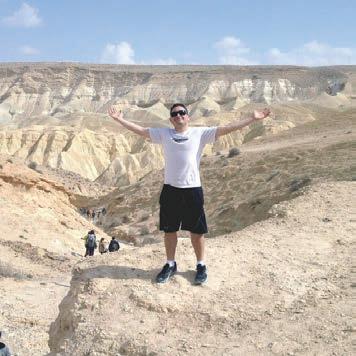
Robert Tanen
Birthright Israel 2000 Alumnus
national flags and the Israeli flag. In that moment, I understood: we are one people, and we have a responsibility to each other. When I got back from the trip, I changed my major to international relations. I couldn’t shake the feeling that I needed to be part of the Jewish story. I took every class I could on the Middle East and Israel. I ended up going to grad school at George Washington University to more deeply study the ArabIsraeli conflict. One of my professors, Bernard Reich, became a mentor. I helped him with the second edition of his Historical Dictionary of Israel, and he included my name in the acknowledgments. That meant the world to me. I remember thinking, I’m in the book. I’m literally part of the Jewish story. My first job in the Jewish world was at the Hillel at Florida Atlantic University. My role was to engage students, spark excitement about their Jewish identity, and encourage them to go on Birthright Israel. I loved it. But I wanted to do more. One Friday night, over Shabbat dinner, I met Rabbi Andy Rosenkranz, the regional director of the Anti-Defamation League (ADL) in Florida at the time. He started talking about fighting antisemitism, building relationships with law enforcement, and supporting victims of hate. Suddenly I was brought back to that day, when I was 11 years old, seeing the swastika spray-painted in red on our synagogue wall, wondering if I was safe. I knew I had to be part of the fight. I joined the ADL and spent seven years there. It was my dream job, the most fulfilling work I could imagine. I didn’t think I would ever leave. But when Andy stepped down — coincidentally, to become the head rabbi at Temple Beth Torah, my childhood synagogue — I accepted a new role in development at the U.S. Holocaust Memorial Museum. Today, I direct a major regional office for the Museum. My work is about sustaining Holocaust memory, helping survivors tell their stories, and making sure the world never forgets.
Since I started in 2014, three-quarters of the survivors I worked closely with have passed. We are truly in the final years. I’ve been honored to serve as a bridge between generations, connecting young people with survivors while we still can. And since October 7th, 2023, everything has become more urgent — the fear, the hate, the stakes. This past summer alone saw the double murder in D.C. and the firebombing attack in Colorado, one of the victims of which was a Holocaust survivor. It doesn’t stop.
And still, I feel so humbled and grateful to be a link in the chain. Like my Bubbe and Zadie, who made a conscious choice to instill a love of Israel in their grandchildren. Like the professors and mentors who helped me find my path. Like the founders of Birthright Israel, who gave an amazing gift to disconnected Jewish kids like me, enriching their lives and ensuring Jewish continuity.
Here's my perspective: Birthright Israel is the most important Jewish initiative of the modern era. I challenge anyone to name a program that has changed more lives. Hundreds of thousands have participated, and there’s no question — it leaves its mark. You can’t go on the trip and come back unchanged. If you were secular, complacent, and unengaged before, you come back committed and inspired.
Looking back, I can say without hesitation: Birthright Israel was the turning point. It made me want to live a Jewish life, to build a Jewish future. I changed my major, changed my trajectory, and never looked back. Without that trip, I don’t know where I’d be. But I know I wouldn’t be here.
why i fight
Birthright Israel Helped Me Speak Up and Take Action
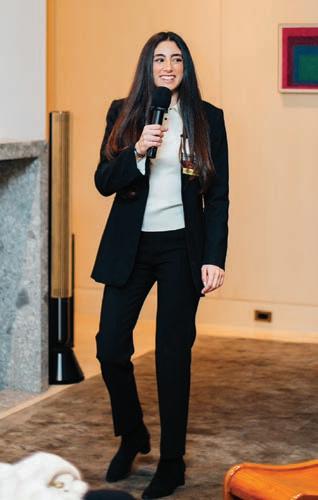
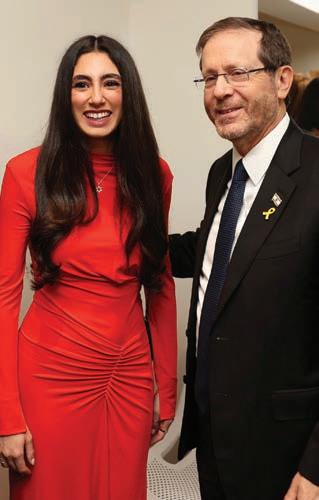
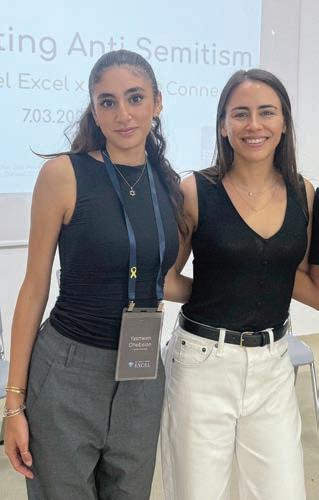
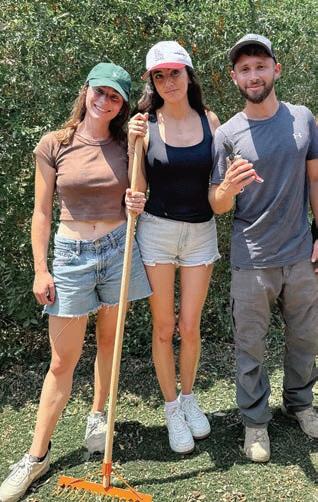
I was raised in Los Angeles in a proud, close-knit Iranian Jewish family. My father left Iran during the Revolution. My mother grew up in Israel and moved to the U.S. when she was seventeen. Most of my extended family lives in Israel — cousins my age, aunts, uncles. I always felt connected. But I didn’t know that one day I would be called to defend that connection.
At Tulane University, I studied finance, marketing, and real estate. I enrolled in an elective course called Race and Ethnicity in the Middle East because I wanted to explore my heritage as an Iranian American and deepen my understanding of the region. What happened in that class changed everything.
Our professor assigned a reading that glorified a terrorist responsible for bombing a bus full of Israeli children during the First Intifada. I was one of only two Jewish students in the class. The other stood up and said, “This isn’t
an unbiased, objective source. It’s a one-sided narrative that disparages Israel and the Jewish people.” The professor got angry and even kicked him out of the classroom.
In that moment, I didn’t have the courage to speak up. That guilt stayed with me. It sparked something, and I resolved to act.
Eventually, I approached that student — Ben Bernstein — and together with our friend Zoë Silverberg, we founded the Movement to Address Antisemitism at Tulane. Our goal was to urge the university to include antisemitism in the same mandatory DEI training already in place for other forms of hate. We assumed this would be a simple request. We were wrong.
The administration was very resistant — pretty hostile, actually. They told us that, according to a survey done eight years ago, Jewish students were one of the most satisfied groups on campus. They said DEI education was for groups that come from “marginalized or oppressed communities,” and they didn’t think Jews counted.
So, we turned to our peers. We launched a petition that gathered support from over 15% of the undergraduate population. More than 20 campus organizations endorsed us, including groups that had never partnered with Jewish or pro-Israel students before. We kept organizing, documenting, and showing up to meetings.
And then came October 7th. A week and a half later, our campus erupted.
At a violent anti-Israel rally at Tulane, I was physically chased across campus by a protester screaming, “F*** you, Jew.” I had to run for safety into the Jewish Studies building. That same day, several of my friends were assaulted — beaten with flagpoles, megaphones, fists, and a belt. One was hospitalized. I watched university maintenance scrub his blood off the ground before he was put into the ambulance.
When I reported to the dean what the student who chased me had shouted at me, she said that “F*** you, Jew” was political speech and offered me three free therapy sessions.
After that, we decided we needed to pivot our strategy. We reached out to Jewish donors and board members. Within 48 hours, we had a meeting with the president and provost. In that short time, we collected data from over 300 Jewish students. It showed that before October 7th, about 16% of Jewish students had experienced or witnessed antisemitism on campus. After October 7th, it rose to 87%.
Following our meeting, the president sent out an email claiming he was committed to making changes. But no action was taken. I followed up constantly — calls, emails, outreach to various departments — and they were unresponsive.
In February, I testified before the U.S. House of Representatives about the civil rights violations Jewish students were facing on our campus. Tulane is now one of over 40 universities under federal investigation for violating Title VI of the Civil Rights Act, which protects students from discrimination based on shared ancestry or national origin. When antisemitism becomes systemic — when institutions are notified and choose to do nothing — that’s a civil rights issue.
This is not theoretical. I’ve had students tell me they were asked to leave exam rooms because others were uncomfortable sitting next to a Jew. My friends have been spat on. By the time I graduated, I had met with university administration about antisemitism over 36 times.
It was during the most overwhelming, demoralizing period of my life that I was accepted to the Birthright Israel Excel fellowship. I can’t overstate what that meant. I know it sounds cliché, but it was the hug I didn’t know I needed. Simply put: Birthright Israel changed my life.
After feeling completely alone and hated on my own campus, I found myself surrounded by Jewish and Israeli peers who not only understood what I had been through, but were equally committed to affecting change. Excel showed us every corner of Israeli society: from wounded soldiers at Sheba Hospital, to executives at Blackstone, to IDF commanders — and we joined the effort to help Israel rebuild by volunteering at Kibbutz Re’im.
One of the most unforgettable moments came when I gave a seminar for the Excel Fellows about antisemitism on college campuses. Afterwards, one of the Israeli Fellows asked to speak with me privately. He told me that a few months earlier, he had personally rescued two hostages — Fernando and Louis — from Gaza. “We’re fighting the same war,” he said. “You and me. You're my sister.” And we cried. That moment gave me the strength to reimagine my future.
I turned down a job offer in corporate finance. Instead, I decided to do something to recreate the feeling and support that Birthright Israel gave to me in my time of despair. I worked with business leader and human rights activist Mandana Dayani and her organization, The Calanet Foundation, to launch Our Campus United — a student-run organization that helps Jewish students fight antisemitism on campus. We built step-by-step resources: email templates, BDS response speeches, legal rights, and strategy guides. We hosted social events to foster allyship. We brought Jewish and non-Jewish students together over food and music. We created community.
Recently, we launched the OCU Chronicle, a global student-run publication on Substack. We did it because too many Jewish students have been silenced or slandered by their campus newspapers. The Chronicle gives students space to write op-eds, tell their stories, or just share a piece of who they are. In just one week, we had 70 contributors, over 3,000 subscribers, and hundreds of thousands of impressions across social media.
None of this would have happened without Birthright Israel. It showed me what I was fighting for. It showed me that young people my age are on the frontlines and that, as a Jewish woman in the Diaspora, I have a duty too. My fight is in hearts and minds.
I’ve stayed close with my Excel cohort. We’ve met up in L.A., in New York, in Tel Aviv. I’ve kept in touch with the Israeli Fellows — some of whom are still serving on the frontlines.
I truly believe Birthright Israel is the single most effective solution to what we’re seeing right now. There’s no better way to show young people what Israel is — and why it’s worth fighting for — than to take them there. To let them see it with their own eyes.
Brandeis University has shown that Birthright Israel participants become significantly more engaged in pro-Israel advocacy after their trip. I believe it. I lived it.
To every donor who makes Birthright Israel possible: you aren’t just sending a young Jewish person to Israel. You’re giving them their future. You’re giving them resilience. You’re giving them belonging. And sometimes, you’re helping them realize they’re a leader.
You never know who’s going to return from that trip ready to fight for our people. I did. And I always will.

The Ever–Living People:
Birthright Israel’s Bright, New Vision for Jewish Education
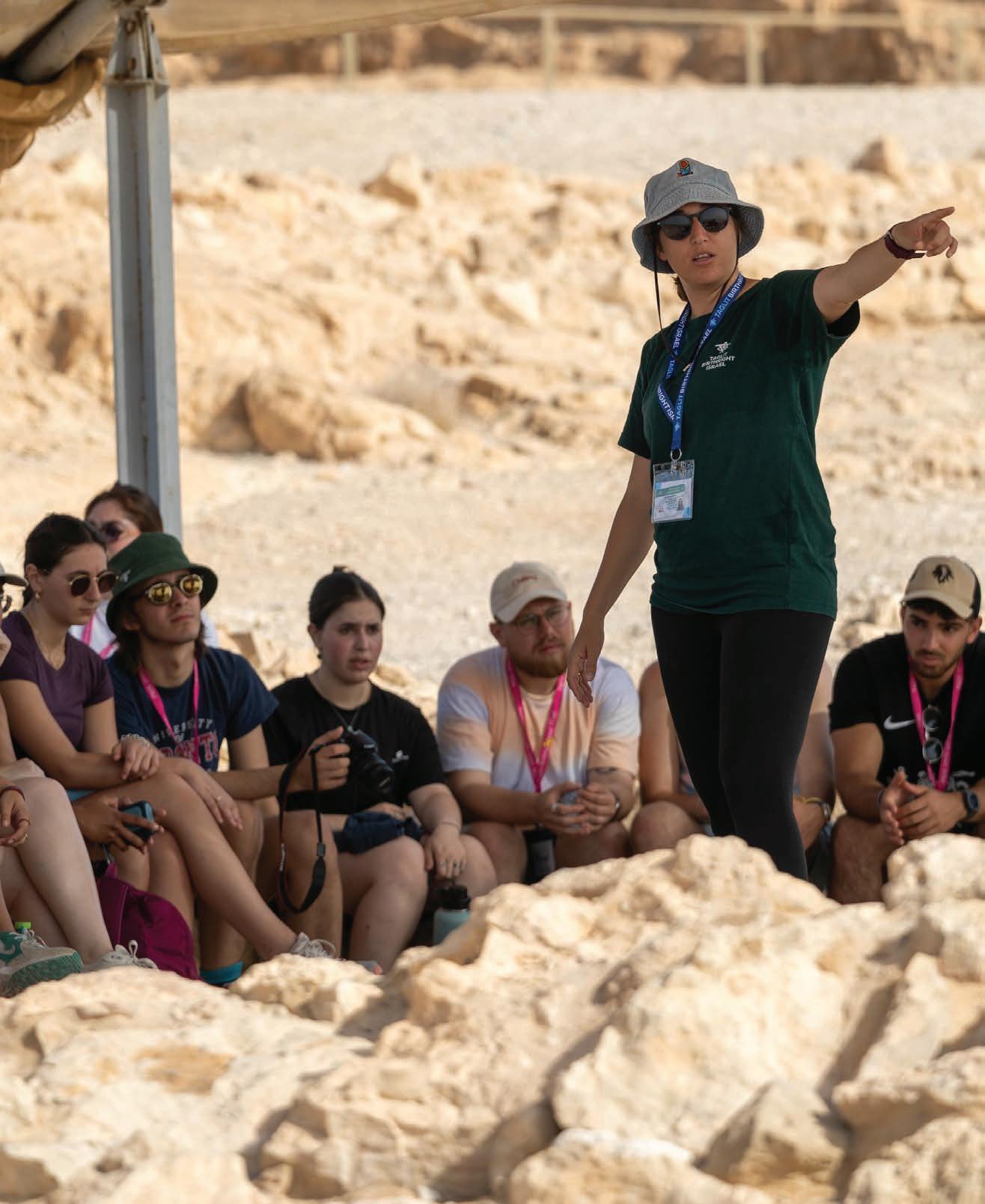
In times that test us, we have the chance to define who we are. The tragedy of October 7th reopened old wounds and made many of us feel vulnerable, isolated, and afraid. And yet, in this darkness, we are called to look inward and forward. We must ask: What kind of story are we telling about ourselves? And what kind of story are we passing on to our children?
For generations, Jewish identity has often been built around trauma: exile, persecution, antisemitism, the destruction of the Temples, the Holocaust. We have been shaped by our survival of tragedies. While it honors Jewish resilience, this survival-based narrative comes at a cost. It can lock us into a reactive mindset — one that defines us by what has been done to us, rather than by what we’ve done and who we choose to be.
The truth is, the Jewish story is much bigger than our suffering. We are a people of vision, learning, innovation, and moral responsibility. Across centuries and continents, we have shaped the world in extraordinary ways — not just in spite of adversity, but because of our determination to live with meaning.
This is the story Birthright Israel aims to tell. And it’s the story Jewish education has to reclaim.
When we teach our children that Jewish identity is primarily about shielding ourselves from antisemitism, we diminish it. But when we show them that being Jewish means building, learning, connecting, and celebrating — then we give them something to cherish and be proud of.
This also means rethinking how we talk about Israel. For many, Israel is still framed as a refuge — a place to escape antisemitism. While that role has been, and remains, real and essential, Israel is not just a reaction to hatred. It is a proactive expression of Jewish peoplehood and purpose. Its foundation lies in the Jewish people’s eternal longing for their land and their right to shape their destiny.
Israel was born of a 2,000-year-old dream. Long before Theodor Herzl, Jews from Babylon to Spain were praying toward Jerusalem, writing poems about Zion, and imagining return. Zion appears more than 150 times in the Tanakh. Zionism is not a modern invention — it’s an ancient longing. Modern Zionism is the latest chapter in a much older story.
When we teach Israel’s history only through wars and crises — 1948, 1967, 1973, and now October 7th — we risk reducing it to a chronicle of catastrophe. But war is not our story. War is what others have tried to do to us. Our story is what we’ve done between those wars: built cities, composed music, founded universities, created a diverse and democratic society, raised families, and planted trees.
So, what should Jewish education look like?
It should teach our youth to take pride in their identity, because it is worth celebrating. It should give them tools to connect with Jewish values, texts, traditions, and peoplehood in ways that feel alive, relevant, and personal. It should help them see their story not only as a series of responses to threat, but as a long arc of creativity, continuity, and renewal.
That is why fighting antisemitism, while essential, is not our stand-alone goal. A young Jewish person who knows who they are, where they come from, and why it matters will naturally stand up against hate — not because they’ve been trained to react, but because they feel ownership, pride, and joy in their Jewishness.
Birthright Israel offers exactly that. It teaches Jewish young adults that they are part of something beautiful and enduring. On our programs, participants see Israel as a place of life. They meet Israelis, explore history, ask hard questions, and experience Shabbat in Jerusalem. They return with a deeper sense of connection, shared responsibility, and hope.
Birthright Israel teaches that we are not only the descendants of survivors — we are the heirs of builders, teachers, and visionaries. Our future will be written not by what others say about us, but by what we choose to say about ourselves.
Simon Rawidowicz once described the Jews as “the ever-dying people,” perpetually on the brink of extinction. But that is not how we must define ourselves. We are the ever-living people — a community defined by resilience, inspired by vision, and grounded in purpose.
When we teach that to the next generation — through Birthright Israel and beyond — we reclaim our agency. We stop reacting to fear and start moving toward an inspiring Jewish future built on pride, connection, and hope. That is the story we choose to tell.
Help Us Choose the 25th Alumni Honoree at


At Birthright Israel: 25 Years Bold, our milestone 25th Anniversary Gala in New York City on Monday, November 3, we will honor philanthropist Lynn Schusterman and 25 extraordinary alumni whose lives and leadership reflect the enduring impact of the Birthright Israel experience.
We've selected 24 remarkable alumni— and now, we're inviting the global Birthright Israel community to help us choose the 25th.
Whether you're a changemaker in your community, a leader in the Jewish world, or someone whose Birthright Israel experience—whether through a classic 10-day trip, a volunteer program, Onward internship, or Excel Fellowship—sparked a powerful personal transformation, we want to hear your story.
Nominate yourself or a fellow alum to be honored on stage at this once-in-ageneration celebration.

